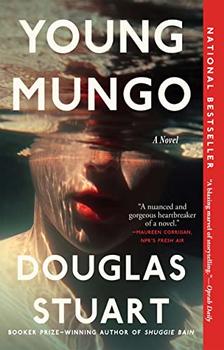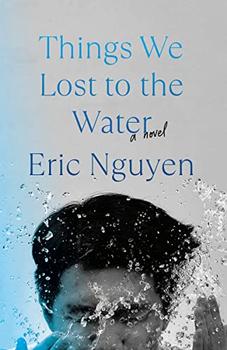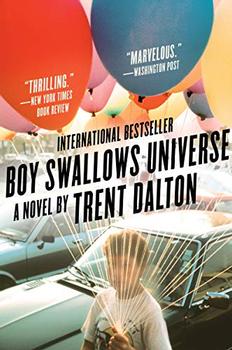Summary | Excerpt | Reading Guide | Reviews | Beyond the book | Read-Alikes | Genres & Themes | Author Bio

A story of queer love and working-class families, Young Mungo is the brilliant second novel from the Booker Prize-winning author of Shuggie Bain.
Douglas Stuart's first novel Shuggie Bain, winner of the 2020 Booker Prize, is one of the most successful literary debuts of the century so far. Published or forthcoming in forty territories, it has sold more than one million copies worldwide. Now Stuart returns with Young Mungo, his extraordinary second novel. Both a page-turner and literary tour de force, it is a vivid portrayal of working-class life and a deeply moving and highly suspenseful story of the dangerous first love of two young men.
Growing up in a housing estate in Glasgow, Mungo and James are born under different stars—Mungo a Protestant and James a Catholic—and they should be sworn enemies if they're to be seen as men at all. Yet against all odds, they become best friends as they find a sanctuary in the pigeon dovecote that James has built for his prize racing birds. As they fall in love, they dream of finding somewhere they belong, while Mungo works hard to hide his true self from all those around him, especially from his big brother Hamish, a local gang leader with a brutal reputation to uphold. And when several months later Mungo's mother sends him on a fishing trip to a loch in Western Scotland with two strange men whose drunken banter belies murky pasts, he will need to summon all his inner strength and courage to try to get back to a place of safety, a place where he and James might still have a future.
Imbuing the everyday world of its characters with rich lyricism and giving full voice to people rarely acknowledged in the literary world, Young Mungo is a gripping and revealing story about the bounds of masculinity, the divisions of sectarianism, the violence faced by many queer people, and the dangers of loving someone too much.
Many of the themes present in Young Mungo will be familiar to readers of Stuart's first novel, the Booker-winning Shuggie Bain, which is set around the same place and time. Yet Young Mungo is more varied and expansive. Stuart delves deeper into the culture of sectarian violence between Protestants and Catholics through the character of Mungo's brother Hamish. A cornerstone of the novel is Mungo's relationship with James, a young pigeon enthusiast whose doocot (the Glaswegian pronunciation of "dovecote," a structure for housing pigeons) becomes a sanctuary against the brutality of the estates. Stuart's delicate descriptions of the young boys' budding romance are filled with a rare, naive tenderness. Above all else, Young Mungo is a brilliant study of the demands of a particular kind of masculinity, one that equates feeling with weakness and callousness with strength...continued
Full Review
(830 words)
This review is available to non-members for a limited time. For full access,
become a member today.
(Reviewed by Grace Graham-Taylor).
 One theme of Douglas Stuart's Young Mungo is the quotidian experience of violence. In part, this violence comes from warring sectarian gangs, whose vicious rivalry wreaks havoc in Glasgow's East End. Enmity between Protestants and Catholics has a long history in Glasgow, as well as Scotland more generally. It can be traced back to the 17th century and, while no longer as prevalent as it was in Young Mungo's late 20th-century setting, remains today.
One theme of Douglas Stuart's Young Mungo is the quotidian experience of violence. In part, this violence comes from warring sectarian gangs, whose vicious rivalry wreaks havoc in Glasgow's East End. Enmity between Protestants and Catholics has a long history in Glasgow, as well as Scotland more generally. It can be traced back to the 17th century and, while no longer as prevalent as it was in Young Mungo's late 20th-century setting, remains today.
The origins of Protestant and Catholic antagonism in Scotland stem from a conflict between the Protestant King William of Orange and the Catholic King James VII of Scots (also known as King James II of England). In 1688, King William, then ruler of the Netherlands and the husband of James'...
This "beyond the book" feature is available to non-members for a limited time. Join today for full access.

If you liked Young Mungo, try these:

by Eric Nguyen
Published 2022
A stunning debut novel about an immigrant Vietnamese family who settles in New Orleans and struggles to remain connected to one another as their lives are inextricably reshaped.

by Trent Dalton
Published 2020
An utterly wonderful debut novel of love, crime, magic, fate and a boy's coming of age, set in 1980s Australia and infused with the originality, charm, pathos, and heart of Extremely Loud and Incredibly Close and The Curious Incident of the Dog in the Night-Time.
Being slightly paranoid is like being slightly pregnant – it tends to get worse.
Click Here to find out who said this, as well as discovering other famous literary quotes!